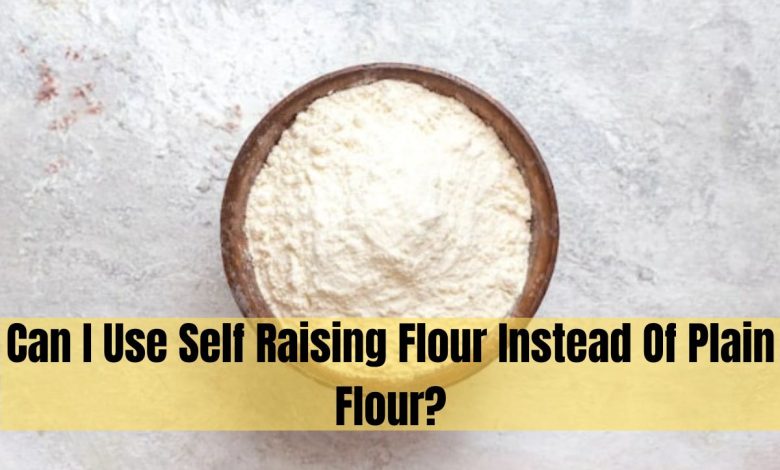Can I Use Self Raising Flour Instead Of Plain Flour?

The answer to the question “Can I Use Self Raising Flour Instead Of Plain Flour” totally depends on what you are making. The difference between plain flour and self-raising flour is that in plain flour we add raising agents and self-raising flour already has them so if you switch between them without knowing the difference, you might destroy what you are making.
This article will teach you when you should and shouldn’t use self-raising flour instead of plain flour. We will also discuss what happens if you use self-raising flour instead of plain flour so stay connected with us till the end!
How Self Raising Flour and Plain Flour Differ?
The answer to this “Can I Use Self Raising Flour Instead Of Plain Flour” can be found later in this article but first you should know the difference between them. Self-raising flour contains baking powder which is a leavening agent and salt.
On the other hand, in plain flour which is also known as all-purpose flour, we add raising agents like baking powder, and the recipe you are following is set according to the flour it uses. When you try to use the substitute, you will not get the same results because not everyone can do the proper adjustments of adding or removing raising agents from the recipe.
When Can I Use Self Raising Flour Instead Of Plain Flour?
If you want to use Self-raising flour in place of all-purpose flour/plain flour, you will be required to change the recipe a little bit. Read below when you can use these two alternatively:
Preparation of Sauce:
When you are preparing sauces, it is better to use plain flour but you can use both plain flour and self-raising flour for the thickening purpose. However, when you use self-raising flour, you will get air bubbles due to self-raising agents.
Baking Cakes:
Typically, people use plain flour while baking cakes but they have to add ingredients like baking powder and baking soda. However, if you wish to use self-raising flour which already contains approximately half a teaspoon of baking powder then you should remove the raising agents from the recipe otherwise your cake won’t bake properly.
Baking Bread:
Can I Use Self Raising Flour Instead Of Plain Flour while baking bread? The answer is no because while baking bread, you don’t want to mess with the recipe. We recommend you follow the same recipe without altering ingredients.
Usually, plain flour is used in baking bread as the recipe includes yeast that works as a raising agent when we mix it in the flour with water salt. When you use self-rising flour, the bread will rise, but it won’t appear uniform and won’t taste nice.
Batter base:
Self-rising flour can be used to make batter bases, however, it is preferable to use plain flour or the flour specified in the original recipe because there is a chance that it won’t cook to the desired consistency and taste.
How Can I Use Self Raising Flour Instead Of Plain Flour?
As we mentioned above what happens if you use self-raising flour instead of plain flour, if still, you wish to use it then you must know that self-raising flour already contains raising agents so you must remove them from the recipe that uses plain flour.
In the 100 grams of self-raising flour, half a teaspoon of baking powder is added approximately so if you wish to use self-raising flour then you must alter the recipe, this is the only way you can use it.
Furthermore, self-raising flour is hard to find in most areas, which is why most baking recipes use plain flour so that people can easily follow the proper recipe.
Why you shouldn’t use self-raising and plain flour alternately?
Now that you know the answer to the question “Can I Use Self Raising Flour Instead Of Plain Flour”, let’s learn why you shouldn’t do it. Sometimes, it may work but most of the time the product becomes too soft or too hard because you messed with the actual recipe, it usually happens due to the sufficiency or insufficiency of the raising agents.
Wrapping Up:
We have provided the detailed answer to the question “Can I Use Self Raising Flour Instead Of Plain Flour” above in this article and now you know when and why you should and shouldn’t do that. It is best to follow the original recipe especially when you are baking as there are high chances of not getting the desired results as we often do mistakes in the measurements.
So, when you use Self Raising Flour Instead Of Plain Flour, you have to remove self-raising agents from the recipe that would definitely affect the results. We hope you found this article useful, share this valuable information with your friends as well.
Frequently Asked Questions (FAQs):
What happens if you use self-raising flour instead of plain flour?
When the original recipe says to use plain flour and you use self-raising flour instead without removing raising agents from the original recipe, the final product does not come out like it should and you will become clueless.
Can you substitute self-raising flour for plain flour?
If you don’t have a choice and plain flour is not available then you can use self-raising flour after removing the leaving agent from the original cluck recipe. If the recipe does not use any raising agents then do not substitute self-raising flour for plain flour.




